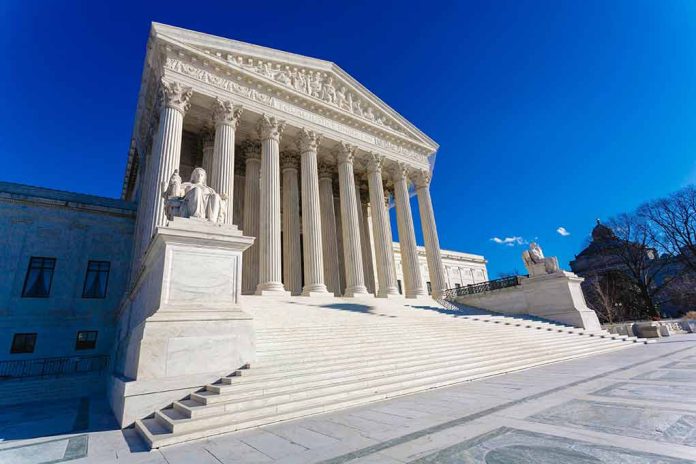
The Supreme Court declines to hear a Biden administration appeal on emergency abortion care in Texas, leaving state regulations intact.
At a Glance
- Supreme Court’s decision maintains Texas’ authority over emergency abortion procedures
- Case centered on the 1986 Emergency Medical Treatment and Labor Act
- Biden administration’s guidance against enforcing state abortion bans faces setback
- Texas argues its law includes health exceptions and aligns with federal regulations
- Decision leaves broader legal question of federal vs. state authority unresolved
Supreme Court Declines Biden Administration Appeal
In a significant development for state rights and abortion regulations, the U.S. Supreme Court has declined to hear the Biden administration’s appeal regarding emergency abortion care in Texas. This decision effectively upholds Texas’ authority to regulate abortion procedures in emergency situations, potentially limiting federal influence over state healthcare policies. The case, which revolves around the interpretation of the Emergency Medical Treatment and Labor Act (EMTALA), highlights the ongoing tension between state and federal powers in the aftermath of the landmark decision to overturn Roe v. Wade.
The Supreme Court’s decision leaves intact a lower court ruling that favored Texas’ stance on emergency abortion care. This outcome represents a significant setback for the Biden administration’s efforts to challenge state abortion restrictions through federal guidance. The administration had previously issued directives against enforcing state abortion bans that conflict with federal law, specifically EMTALA, which mandates emergency care for patients at federally funded hospitals.
Texas Law and Federal Regulations
Texas has argued that its law includes health exceptions and does not conflict with federal regulations. The Texas Supreme Court has clarified that doctors don’t need to wait for immediate danger to perform abortions, which the state claims aligns with federal regulations. However, medical professionals have expressed concerns over unclear definitions of health exceptions in Texas law, leading to increased complaints about women in medical distress being turned away from emergency rooms.
Supreme Court won't let Biden administration force Texas hospitals to provide emergency abortion carehttps://t.co/lhW734RyP6
— CNN (@CNN) October 7, 2024
Implications for Healthcare and Legal Landscape
The Supreme Court’s decision not to hear the case leaves unresolved the broader legal question of federal versus state authority on abortion-related emergency care nationwide. This uncertainty has created a complex legal landscape for medical professionals, particularly in states with strict abortion bans. The termination of pregnancies has been essential for preventing life-threatening complications, but the current legal environment has created hesitation among healthcare providers.
🚨🇺🇸SUPREME COURT DECLINES TO HEAR BIDEN APPEAL IN TEXAS EMERGENCY ROOM ABORTION DISPUTE
The Supreme Court has declined to hear a Biden administration appeal concerning emergency room abortion care in Texas, leaving in place a lower court ruling in favor of the state.
The case… pic.twitter.com/E6SIMDuk4V
— Mario Nawfal (@MarioNawfal) October 7, 2024
The court’s action follows its 2022 ruling that overturned Roe v. Wade, which has led to more state-level abortion restrictions. The 5th U.S. Circuit Court of Appeals previously ruled that the Biden administration exceeded its authority in issuing guidance against state abortion bans. The Supreme Court’s decision to decline hearing the case, without providing detailed reasoning or publicly noted dissents, further solidifies the current legal standing of state abortion regulations.
Additional Legal Developments
In addition to the Texas case, the Supreme Court also declined to hear related cases from Guam and Alabama, further shaping the legal landscape of reproductive rights. These decisions collectively reinforce the trend of increasing state control over abortion regulations, with potential implications for emergency medical care and women’s health across the country.
Sources:
- Supreme Court declines to hear Biden appeal in Texas emergency room abortion dispute
- US Supreme Court rebuffs Biden administration on emergency abortions in Texas
- Supreme Court Upholds Order on Emergency Abortions That Violate Texas Law
- Supreme Court declines Biden’s appeal in Texas emergency abortion case
- Supreme Court declines Biden’s appeal in Texas emergency abortion case
- Supreme Court Declines to Hear Texas Abortion-Law Challenge in Blow to Biden Administration









